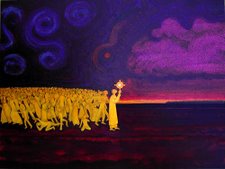Haven't read a lot of Sobrino, but in my limited opinion I have not found anything problematic with his Christology. I can understand the Congregation's concern with Roger Haight, but I think they were a bit trigger happy with Fr. Dupuis, and I fear they are likewise over-reacting to Sobrino. Also, I wouldn't be surprised if some of the right wing death squad supporting hierarchy in Latin America have been pushing for this.
--------------------------------------------------Allen on Sobrino
March 16, 2007, 1:11 pm
John Allen has posted an analysis of the issues around the CDF's notification regarding the works of Jesuit theologian Jon Sobrino. He makes the important point--overlooked in many news accounts--that the notification has little to do with past disputes about Liberation Theology and much more to do with current debates about Christology:
In fact, however, the Notification from the Congregation for the Doctrine of the Faith on Sobrino is not quite as "retro" as it appears. A close reading reveals that its main concern is not really old arguments over liberation theology and Marxism, but rather more recent debates over the uniqueness and singularity of Jesus Christ. The text is of a piece, therefore, not with the 1984 "Instruction on Certain Aspects of the Theology of Liberation," but rather the 2001 document "Dominus Iesus," and the proper analogy is not to 1980s-era investigations of Leonardo Boff or Gustavo Gutiérrez, but rather to notifications over the last six years regarding Jesuits Roger Haight and the late Jacques Dupuis...
Surveying the contemporary scene, the Vatican's core theological concern is that, in the name of cultural and religious pluralism, traditional doctrines about Christ as the Son of God and Savior of the World gradually will be drained of their content. Theologians may continue to use the old vocabulary, but what they mean by it will mutate, and over time the Second Person of the Trinity will be replaced with a merely human Jesus analogous to other great religious founders and prophets.
Christology is, to this way of thinking, the "canary in the coal mine" for the impact of religious relativism on Catholic doctrine. Once the decision is made that it's arrogant to impute a special truth value to Christianity, then traditional claims about Christ have to be understood as "metaphors" or "symbols," rather than as statements of fact. If that's allowed to happen, then Christian doctrines become a sort of religious poetry, rather than a body of teaching grounded in ultimate reality.



No comments:
Post a Comment